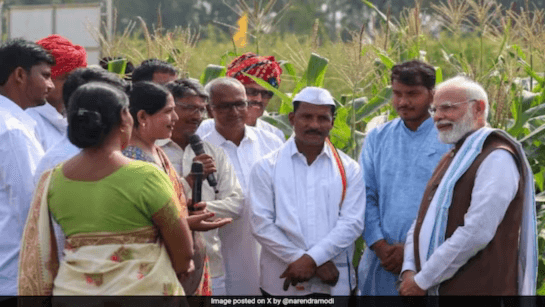Major Boost for Indian Farmers: PM Modi Launches ₹35,440 Crore Mega Schemes Today
Modi unveils three monumental farm schemes worth ₹35,440 crore, aiming to empower farmers, enhance self-reliance, and transform India’s agricultural landscape. Get full details on new benefits, scheme features, and how millions will benefit.
Major Gift to Farmers: PM Modi Launches Mega Schemes Worth ₹35,440 Crore
The Indian agricultural sector has received a landmark boost with Prime Minister Narendra Modi announcing three transformative mega schemes, collectively worth ₹35,440 crore
Major Boost for Indian Farmers: PM Modi Launches ₹35,440
specifically designed to change the future of farming in India.
These initiatives, launched at the Indian Agricultural Research Institute, represent a comprehensive push to make Indian agriculture not only more productive but also globally competitive and sustainable.
Overview of the Schemes
Two of the standout initiatives within this package include the PM Dhan Dhaanya Krishi Yojana and the Mission for Aatmanirbharta in Pulses.
Both programs are set to impact over 100 key agricultural districts across the country, with broad objectives ranging from crop diversification and storage infrastructure to improving credit access and irrigation facilities.
PM Dhan Dhaanya Krishi Yojana: With an outlay of ₹24,000 crore, this scheme will focus on ramping up productivity, adopting sustainable practices, and enhancing storage and irrigation at the village level.
Farmers will get better access to both long and short-term credit, making modern agriculture far more accessible.
Mission for Aatmanirbharta in Pulses: Allocated ₹11,440 crore, this mission aims to transform India’s pulses sector. The focus here is on boosting productivity and expanding areas under pulse cultivation, strengthening procurement and processing, and reducing post-harvest losses.
In addition to these, the initiative integrates 36 government programs to deliver comprehensive support for food and nutritional security, rural empowerment, and innovation.
Why This Matters for Farmers
Announcing these schemes, PM Modi reiterated the government’s commitment to doubling farmers’ incomes and making Indian agriculture self-reliant.
He stressed the importance of not just feeding India but positioning Indian agriculture to contribute to global food supply chains, a vision aligned with the Aspirational Districts model’s past success.
Farmers can expect:
Greater opportunities for income through diversification and value addition.
Enhanced credit and insurance coverage for risk mitigation.
Upgraded storage, irrigation, and post-harvest infrastructure, reducing losses and improving market access.
A dedicated push for innovation, sustainable practices, and crop resilience.
Benefits at a Glance
| Scheme Name | Allocation (₹ crore) | Key Focus Area | Target Impact |
|---|---|---|---|
| PM Dhan Dhaanya Krishi Yojana | 24,000 | Crop diversification, storage, credit | 100 districts |
| Mission for Aatmanirbharta in Pulses | 11,440 | Pulses productivity, value chain | National, all states |
| Combined Allied Sector Push | 5,450 + 815 | Animal husbandry, fisheries, food | All-India |
The effort also includes new projects in allied sectors, further widening the net of rural beneficiaries.
How Will These Schemes Work?
The schemes are structured to drive both top-down support (policy, technology, funding) and bottom-up empowerment (local input, regional customization).
For example, increased funding will go toward:
Local cold storage and warehousing to help smallholders aggregate and store produce.
Modern irrigation projects to optimize water use and reduce dependency on monsoon rains.
Technical training for farmers on sustainable and technology-driven agricultural techniques.
Pulses, vital for both nutrition and soil health, will receive special attention to reduce India’s longstanding import dependence and ensure food security.
Implementation Details
The schemes will leverage direct benefit transfers (DBT) to ensure transparency and timely assistance.
Stakeholder collaboration, involving state governments, research institutions, and private partners, will speed up deployment.
Each targeted district will get customized interventions based on agro-climatic zoning and local cropping patterns.
What Does It Mean for the Future?
These initiatives are widely seen as strategic moves to break long cycles of farmer distress by empowering grassroots communities, strengthening supply chains, and promoting self-reliance.
are expected to set a new benchmark for farmer welfare and innovation in developing economies.
Expert View and Farmer Testimonials
Agricultural experts have hailed the schemes as a timely investment for the sector’s modernization and food security.
Early farmer reactions from targeted districts reflect optimism, especially for improved credit options and reliable access to storage and irrigation.
One farmer shared, “For years, the challenge was always lack of storage and no modern irrigation. With these schemes, we feel supported and hopeful for a better future.”
Conclusion
PM Modi’s ₹35,440 crore mega gift to farmers is one of the most significant rural welfare efforts ever in India. By integrating advanced policy instruments, direct benefits, and infrastructural investment, the government not only aims to fortify food security but also uplift millions of farming families and drive India’s agricultural transformation.
